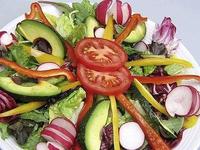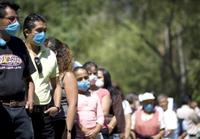-
Sprouts blamed for U.S. Salmonella outbreak
After infecting more than 4,000 people across Europe and North America, sprouts have been blamed once more for a food-borne outbreak, this time in the United States; on Tuesday the Centers for Disease Control and Prevention (CDC) announced that sprouts were the source of a Salmonella outbreak which has sickened more than twenty people across five states including Washington, Montana, and Idaho
-
-
New tool predicts drought
Knowing when to instigate water saving measures in dry times will be easier from now on, following a breakthrough in drought prediction: an Australian researcher has developed a way to predict droughts six months before they begin
-
-
Report warns falling crop yields could spell disaster
A recent study found that as temperatures continue to rise the geographical range of staple crops like corn and beans will become increasingly limited, potentially resulting in massive food shortages; there are currently fifty-six million people who lack food security as temperatures are expected to rise above 86° Fahrenheit; at that temperature, beans are no longer a viable crop, while rice and corn yields suffer
-
-
Sprouts declared source of deadly E.coli outbreak, again
After declaring last week that sprouts were not the culprit of the deadly E. coli outbreak, German officials are now saying that sprouts were indeed the source after all; the announcement comes without conclusive evidence that sprouts were the source of the bacterial outbreak; instead health investigators are relying on circumstantial evidence; tests from the farm located in Lower Saxony have come up negative for the rare strain of E. coli that is sickening patients
-
-
EU harshly critical of Germany's approach to E. coli crisis
In Germany, responsibilities for responding to a crisis — any crisis — are spread across local, municipal, state, and federal agencies, with no central information center to inform the public, and with little coordination among the various responding bodies
-
-
Terrorist may use food poisoning as weapon
Food and drink sold in Britain — in stores, at restaurants — are under an increasing threat from terrorist groups which might try to poison supplies, thus wreaking havoc and sowing fear, a government security advisers have warned
-
-
Germany falsely identifies sprouts as source of outbreak
German health officials have mistakenly identified the source of the deadly E. coli outbreak once again; over the weekend, officials had announced that sprouts were the cause of an outbreak that has killed at least twenty-two people and left more than 600 in critical condition; authorities tested eighteen sprout mixtures, but on Monday results showed that they were not the source of the outbreak; much to the displeasure of Spanish farmers, last week German authorities incorrectly pointed to Spanish cucumbers; officials estimate that Spain’s fruit and vegetable exporters are losing as much as $290 million a week; Spain is seeking reparations
-
-
Bacteria designed for sleuthing
Seven Cambridge University undergraduates spent the summer of 2009 genetically engineering bacteria to secrete a variety of colored pigments, visible to the naked eye; they designed standardized sequences of DNA, known as BioBricks, and inserted them into E. coli bacteria — so the bacteria can now change its color to red, yellow, green, blue, brown, or violet; the bacteria can be programmed to do useful things, such as indicate whether drinking water is safe by turning red if they sense a toxin; other uses for the design bacterium include monitoring food additives, patenting issues, personalized medicine, terrorism, and new types of weather
-
-
How safe is Kansas bio lab from twisters?

DHS officials say they are confident that the proposed bio-defense lab in Manhattan, Kansas, located in the heart of tornado alley, is capable of withstanding a direct hit from a powerful twister; engineers have hardened the $650 million National Bio and Agro-Defense Facility (NBAF) to withstand wind speeds of up to 230 miles per hour; but critics of the planned facility argue that the new standards are inadequate and that the facility must be further reinforced to ensure that in the event of a natural disaster the deadly pathogens and viruses stored there are not spread
-
-
Germany struggles to find source of deadly E.Coli outbreak

German health officials struggling to find the source of deadly E.Coli outbreak suffered another setback when Spanish cucumbers were found to have been incorrectly declared the source of the infections; so far seventeen people have died and more than 1,500 Europeans have been sickened by a rare strain of enterohemorrhagic E. Coli (EHEC); eighty new cases were reported in Hamburg between Monday and Tuesday alone and hospitals are treating 110 patients critically ill with hemolytic uremic syndrome (HUS); the current outbreak has disproportionately affected women, and health officials are struggling to understand why; health officials have urged to not purchase any vegetables declared as potentially dangerous
-
-
Foot-and-mouth disease control measures could be reduced
A new study of foot-and-mouth disease shows that cattle afflicted with the virus are only infectious for a brief window of time — about half as long as previously thought; this finding suggests that the controversial control measures used to halt the disease’s spread, such as killing large numbers of livestock, could be reduced
-
-
A "whole-system redesign" of U.S. agriculture
Transformative changes in markets, policy, and science, rather than just incremental changes in farming practices and technology, will be critical if the United States is to achieve long-term sustainability in agriculture, according to a nationwide team of agriculturists that includes a University of California, Davis, animal scientist
-
-
U.S. agriculture escaped impacts of global warming -- for now

Global warming is likely already taking a toll on world wheat and corn production, according to a new study led by Stanford University researchers, but the United States, Canada and northern Mexico have largely escaped the trend; the researchers found that global wheat production was 5.5 percent lower than it would have been had the climate remained stable, and global corn production was lower by almost 4 percent; Global rice and soybean production were not significantly affected
-
-
Risk of agroterrorism growing
The United States imports so much of its food and food ingredients from other countries, that terrorists have many more opportunities to harm Americans and damage the U.S. economy; a high FDA official said that increased U.S. attention to the issue and questions over whether hostile actors have the technical capacity to mount such an attack notwithstanding, the likelihood of being poisoned by intentionally contaminated food is growing
-
-
Information sharing seen as public health "game changer"

Public health officials are pushing for the creation of shared databases that contain electronic health records (EHRs) to help combat infectious diseases and stop epidemics; a CDC official pointed to the positive impact that electronic health information exchanges (HIE) have on public health; during the 2003 SARS outbreak, Milwaukee helped establish a four-state network that automatically detected new cases of SARS based on electronic reports from local hospital emergency rooms; manual reporting of test results is a slow process, but with the use of electronic reporting public health officials can now quickly identify epidemics and pandemics as they occur
-
- All
- Regional
- Water
- Biometrics
- Borders/Immig
- Business
- Cybersecurity
- Detection
- Disasters
- Government
- Infrastructure
- International
- Public health
- Public Safety
- Communication interoperabillity
- Emergency services
- Emergency medical services
- Fire
- First response
- IEDs
- Law Enforcement
- Law Enforcement Technology
- Military technology
- Nonlethal weapons
- Nuclear weapons
- Personal protection equipment
- Police
- Notification /alert systems
- Situational awareness
- Weapons systems
- Sci-Tech
- Sector Reports
- Surveillance
- Transportation
Advertising & Marketing: advertise@newswirepubs.com
Editorial: editor@newswirepubs.com
General: info@newswirepubs.com
2010-2011 © News Wire Publications, LLC News Wire Publications, LLC
220 Old Country Road | Suite 200 | Mineola | New York | 11501
Permissions and Policies
Editorial: editor@newswirepubs.com
General: info@newswirepubs.com
2010-2011 © News Wire Publications, LLC News Wire Publications, LLC
220 Old Country Road | Suite 200 | Mineola | New York | 11501
Permissions and Policies
